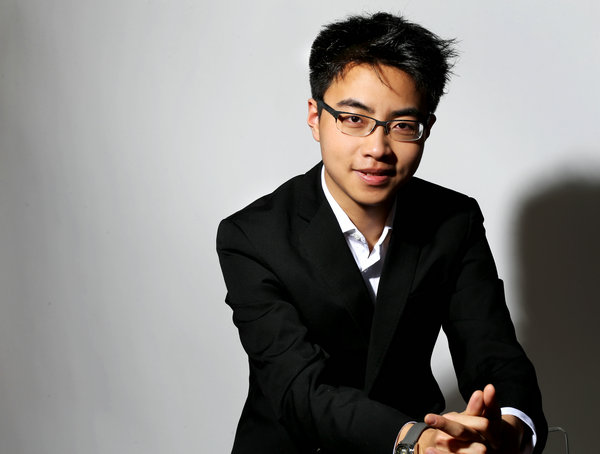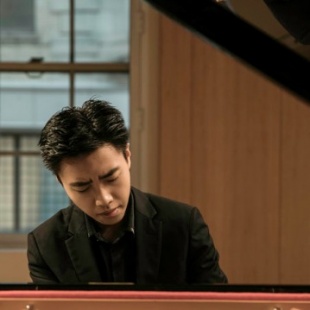From east to west and all that jazz


A Bu also showcases his composing talent in the new album with original pieces including the title song One Step East, influenced by Chinese folk music, and Oriental Interlude, in which the pianist explores his oriental identity through musical language.
He has also adapted one of his favorite musicians, Cui Jian's song The Lost Season, which was written, performed by Cui, a pioneering Chinese rock musician, and first released in Cui's album Show You Color in 2005.
"I've always wanted to adapt Cui Jian's songs, and The Lost Season is full of Chinese sounds," A Bu says. "I met Cui Jian when I was a teenager and played during a jam session at a jazz club in Beijing. He is very interested in jazz and is very supportive."
On Oct 9 A Bu has released a single, Imagine, adapted from John Lennon's song of the same title. It is a version that A Bu performed in his recital held on Aug 2018 at Poly Theater in Beijing. He released the single on the day of Lennon's 80th birthday, paying tribute to the legendary musicians.
In his new album, One Step East, A Bu also pays tribute to Lennon by performing his song Jealous Guy, written and performed by Lennon and first appearing on his 1971 album Imagine.
"From the start I was particularly impressed with A Bu's piano playing, which artfully balances classical technique with very advanced improvisational jazz," Pierson the producer says. "In addition, his distinctive compositional style shows a neat fusion of classical, jazz, and what I perceive (perhaps naively) as roots in Chinese folk music. His individuality is very rare for an artist of his age.
"Although I'm very happy with the entire project, I'm particularly attracted to One Step East and The Lost Season because as much as anything else on the project, they live on the bridge between Chinese music and jazz."
A Bu's first album, 88 Tones of Black and White, which came out in 2014, with which he performed with the Chinese jazz musicians Shao Haha, a drummer, and Ma Kai, a bassist. With the American bassist Tom Kennedy and drummer Ryan J. Lee, A Bu released his second album, Butterflies Fly in Pairs, in 2016.
"The new album has a diversity of music styles, which, compared to my previous two albums, has richer sounds and delivers much more information," A Bu says. "Though I performed with Grenadier and Harland for the first time, they are very mature musicians and give me lots of space to improvise."
He could not find the proper names for some of his original compositions such as Ballade in E and Ballade in B on the new album, he says, and he leaves the space, which allows the listeners to imagine.
"A Bu's mastery of the musical languages of both classical and jazz-possessing the quality of a professional performer and an imaginative improviser at once," says the Grammy-Award winner drummer Harland.
Grenadier remarks on A Bu's extraordinary composing ability, calling his original compositions "beautiful and expressive" in a lyrical style.
The legendary Russian pianist and composer Nikolai Kapustin (1937-2020), whose music embraced the vocabulary of jazz idioms and classical tradition, regarded A Bu as "one of the most excellent pianists of the young generation who, at the same time, holds a wide range of musical tastes".
In November 2016 A Bu performed Kaputin's works, including Big Band Sounds, Op. 10 and Piano Concerto No. 2 Op. 14, during a concert held at Moscow International House of Music. The concert, featuring music pieces by Kaputin, was held before the Russian pianist's 79th birthday. After the concert, A Bu visited him on his birthday, Nov 22.
Born in Beijing, A Bu, whose real name is Dai Liang, began training in classical piano after he walked into a music shop with his parents and pointed to the biggest instrument he could see, a piano, when he was 4.
Before he turned 10 he was enrolled to study at the primary school of the Central Conservatory of Music in Beijing.
After his father, Dai Bin, a music lover, found that his son enjoyed playing impromptu for hours after finishing the practice sessions assigned by his teachers, Dai Bin invited the Chinese pianist Kong Hongwei, who formed one of the country's pioneering jazz bands, Golden Buddha, to teach his son for more than five years.
The father usually took his son to watch live jazz music at Beijing's popular jazz music venues, such as CD Cafe and East Shore Cafe, where Dai Liang not only watched a lot of live jazz performances but also performed with jazz musicians.
"I love playing onstage, which is like a process of sharing, and it makes me happy," A Bu says.
In 2015 A Bu won the First Prize and Audience Choice of the prestigious Montreux Jazz Solo Piano Competition in Switzerland, the first Chinese musician to do so. A year later he was invited to give solo performances during the 50th birthday edition of Montreux Jazz Festival.
Because of the coronavirus pandemic, A Bu has spent a lot of time practicing at home over the past 11 months, which allows him to write music.
"I am drawn to ideas I get from my everyday life, " he says. "I collect them in my phones or on paper. Some of the ideas will be developed into compositions. Besides being a pianist, I want to have different roles as a musician, such as composer, producer, conductor and arranger by taking part in various projects."
Contact the writer at [email protected]



































